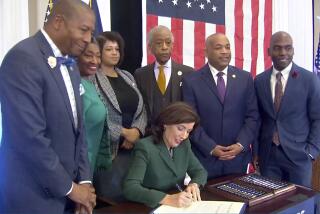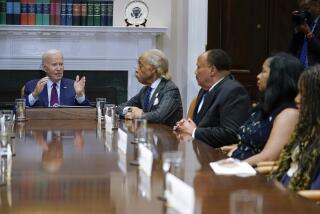House Letter Urges Clinton to Appoint Panel on Race
- Share via
WASHINGTON — A day after the “Million Man March,” a group of House members urged President Clinton on Tuesday to appoint a commission on U.S. race relations.
“We believe a new presidentially appointed, bipartisan commission with impeccable credentials may lead to a healthy discussion and a new era of progress between the races, both of which this country desperately needs,” the bipartisan, racially mixed group of members said in a letter to Clinton.
White House spokeswoman Ginny Terzano said Clinton was aware of the letter.
“We’ll review it carefully,” she said, noting Clinton had called for “an honest and open dialogue” on race relations in his speech Monday in Texas.
The call for a commission came a day after the march organized by Nation of Islam leader Louis Farrakhan. The official Park Police count says the rally drew about 400,000 black men to the U.S. Capitol to promote unity and self-reliance and an end to violence. March organizers say the count is much too low.
The letter was signed by Democrats Charles E. Schumer and Charles B. Rangel of New York, John Lewis of Georgia and Eleanor Holmes Norton of the District of Columbia. Republican signees are James Leach of Iowa and Bill McCollum of Florida. Rangel, Lewis and Norton are black; the others are white.
“I, for one, fear for the future of the country. Today, more and more, the country is divided against itself,” Schumer said at a news conference.
Among the examples Schumer cited was the reaction to the acquittal of black football great O.J. Simpson in the Los Angeles murders of his ex-wife and Ronald Goldman. Most whites thought Simpson was guilty while most blacks believed he was not guilty.
Lewis, a veteran of the civil rights movement, said great progress had been made in race relations over the last 40 years, but “the scars and stains of racism are still deeply embedded in our country.”
A similar commission created by President Lyndon B. Johnson after several urban riots found in 1968 that the United States was moving toward two separate, unequal white and black societies.
More to Read
Sign up for Essential California
The most important California stories and recommendations in your inbox every morning.
You may occasionally receive promotional content from the Los Angeles Times.










